Your humble author and Imelda Marcos have been in the same place at the same time only once. Thirty years ago the trade winds had tempted a much younger me to a dusty road beside parched fields in the provincial heartland of the Philippine archipelago. Amongst a drought and an insurgency, a colourful roadside banner sagged between two coconut palms while promising, “Meet Imelda Marcos here today”. The tinder-dry paddies were packed with people. Over the watchful eyes of ever-mild water buffalo patiently shackled to their carts, seed was not being sown, rice was not being planted. In the middle of the Biblical throng, Mrs Marcos preempted the misplaced promises of other politicians by giving away money before being elected.
In far away Manila, the Commission For Elections had banned campaigning, let alone open-air bribery. Candidates were allowed a bio-data CV and a brief non-political TV interview. Far from the capital and always a law onto herself, Imelda and the goons carrying her sacks of cash took no notice.
Standing at the edge, this white-as-paper Joe with the big nose and blue eyes attracted attention. Not all of it smiles and blessings. My nervous companions began to tug at my cotton sleeves, keen to return to the safety of the FX and continue our journey to the provincial capital for the Easter week preparations. Religious and secular, these were to include both the lengthy seasonal liturgy of the Church, an Easter Sunday roast dog dinner, lots of gunfire and gambling on fighting cocks.
I acquiesced and, as if a ship passing too distant in the night, missed out on a 1,000 Peso note passed personally by a former First Lady of the Philippine Republic as she grimaced from the hum of voters on a sweltering afternoon on a rice terrace between coffee plantations and coconut palms.
Imelda needn’t have bothered. In the subsequent May 11th 1992 plebiscite, the Philippine people sensibly chose General Fidel Ramos, with Ferdinand Marcos’s widow and her own party, the New Society Movement, finishing fifth out of seven candidates with only 10% of the vote.
It wasn’t always so and, astonishingly to those not au fait with the local politics, it was to turn full circle.
Imelda Remedios Visitacion Trinidad Romualdez was born on the 2nd July 1929. Yes, she is 92. Although born in Manila, where her father Vincente practised law, her roots lay with the Romualdez political dynasty of the central Philippine province of Leyte.
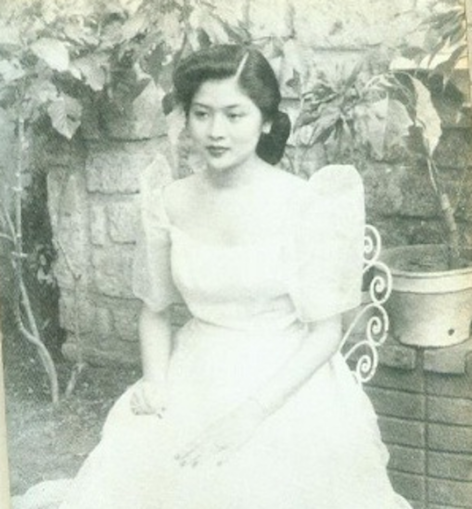
Imelda Marcos in 1953
Unknown photographer – Publis domain
Following an education disrupted by a Japanese occupation that saw the family return to their home province, Imelda enrolled as a student at St Paul’s College, Tacloban. Well connected, a high grades student, natural beauty and talented singer, Imelda divided her time between the provinces and Manila where she mixed in the same circles as Ferdinand Emmanuel Edralin Marcos (known as FM), scion of Ilocos province’s Marcos dynasty from the north of the northernmost island of Luzon.
An accomplished trial lawyer and up and coming Liberal member of the House of Representatives, FM had been a personal assistant to the fifth president of the republic, Manuel Roxas. Ferdinand and Imelda married in a civil ceremony in the spring of 1954. She was 25, he 36. She, a blushing innocent, he already ‘married’ to a common-law wife, Carmen Ortega, with whom he had fathered three children. In doing so two behemoth clans of the Phillippine political elite were joined together. Two weeks later, they married again in a religious ceremony at San Miguel Pro-Cathedral in Manila where the bride had been baptised. At the wedding breakfast, President Ramon Magsaysay hosted a Malacañang Palace reception for three thousand invited guests drawn from the South East Asian nation’s elite.
While FM rose through the notorious Philippine political quagmire, becoming a senator in 1959 and elected president in 1965, his wife was raising children, three girls and a boy. Imee was born in 1955, Ferdinand Junior (known as Bongbong) in 1957 and Irene in 1960. Adopted Aimee joined the family in 1979. Ferdinand Marcos was head of state between 1965 and 1986, ruling by marshall law from 1972. A vigorous anti-Communist and host of strategic US naval and air bases at Clark Field and Subic Bay, a Cold War/Vietnam War blind eye was turned to the activities of the kleptocrat’s kleptocrat. The Marcos’s attended the funeral of former President Eisenhower in ’66. Nixon visited Manila in ’69.
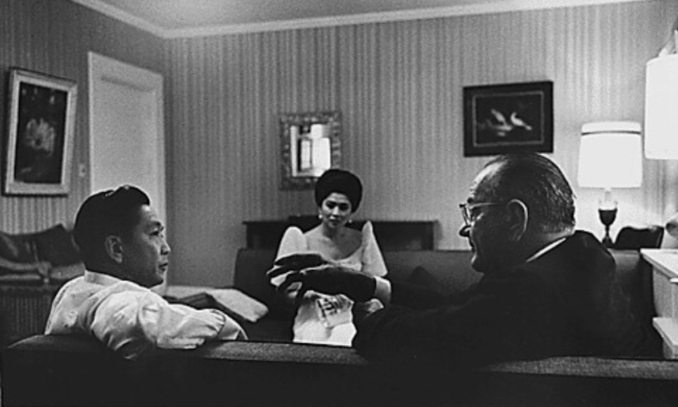
President Johnson with Ferdinand and Mrs. Marcos,
pingnews.com – Public domain
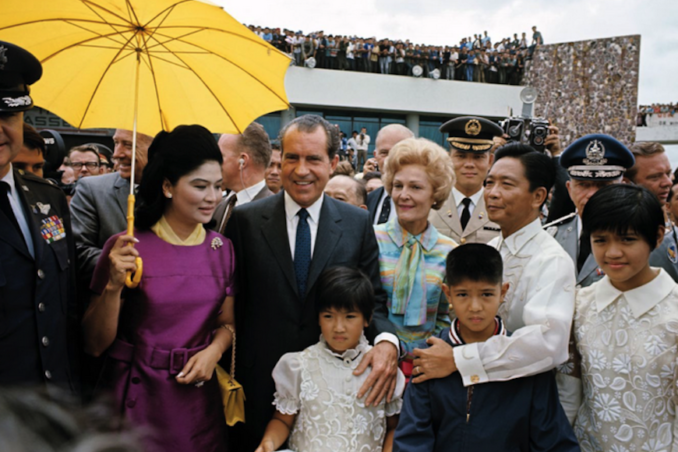
Richard and Pat Nixon (center) at the Manila International Airport,
White House Photo Office – Public domain
Five years senior to myself, and as if in a parallel life, a young Bongbong had also stood at the edge of a foreign field and wondered of his welcome. In 1970, aged 12, Ferdinand Romualdex Marcos Jr was sent to the Benedictine Order’s Worth School in Sussex. A reasonable scholar, he was later admitted to St Edmond Hall, Oxford, to study Philosophy, Politics and Economics but failed to graduate and was instead awarded a special diploma in Social Studies. Further study followed at the Wharton Business School of the University of Pennsylvania but was interrupted by his election to be vice-governor of his home province of Ilocos Norte in 1983. By 1985, his father had ‘crony capitalism’ appointed him to the board of the Philippine Satellite Corp.
By then the wheels were coming off the Marcos regime. Exiled opposition leader Ninoy Aquino had been given permission to return to the country but upon arrival at Manila’s International Airport was taken off the plane and shot dead. The resulting People Power Revolution propelled Ninoy’s widow, Corazon Aquino, into power. During the turmoil, the Malacañang Palace, now the Marcos presidential residence, was stormed by the mob revealing the first family’s excess and all those shoes.
Both Ninoy Aquino’s and Corazon’s families (the Tarlac Cojuangcos) were also from the Philippine elite. The revolution would have been more accurately labelled ‘Rich People’s Power’.
As a result of the uprising, the Marcos’s left for exile in Hawaii. In the following six years, Mrs Aquino proved to be useless, lost control of large parts of the county and chose not to contest the presidential election of 1992, during which voting passed surprisingly smoothly. General Ramos became president for a six-year spell which, in relative terms, proved peaceful and prosperous for the archipelago.
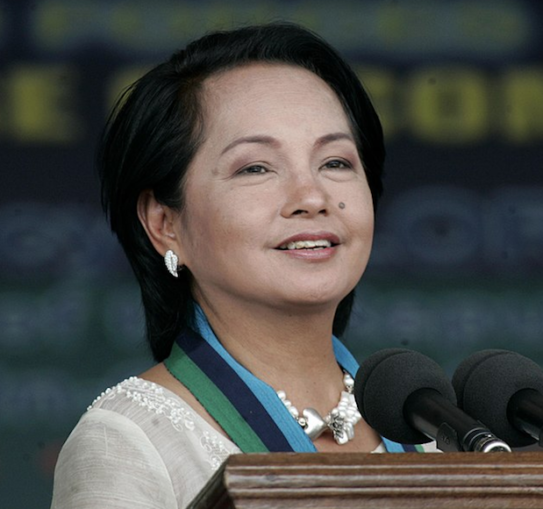
President Gloria Macapagal-Arroyo smiles as she delivers her speech,
MARCELINO PASCUA – Public domain
Following FM’s death in 1989, the Marcos family were allowed to return from Hawaii and did so despite facing a raft of criminal charges. By 1991, Bongbong had entered the House of Representatives, elected in the family’s Ilocos Norte fiefdom. By 1998 he had left to become a provincial governor, returning in 2007 after taking a seat vacated by sister Imee. In June 2010, he was elected to the Philippine Senate.
Meanwhile, a never-ending set of historic legal claims against the Marcos’s ground glacially and fruitlessly through the courts, augmented by more recent corruption charges. In 2016 Bongbong led an unsuccessful vice-presidential campaign as running mate to Miriam Defensor Santiago who had been an opponent of his mother back in 1992. Then Miriam had finished a respectable second to General Ramos despite, in her one allowed non-political TV interview, promising to cut up her political opponents and feed them to the sharks in Manila Bay. As further proof of Philippine politics staying in the families, Ms Santiago’s running mate in ’92 had been Ramon Magsaysay Jr, son of the aforementioned host of FM and Imelda’s wedding breakfast.
After Ramos’s six-year term ended in 1998, Joseph Estrada was elected president, his vice president being Gloria Macapagal Arroyo, daughter of ninth president Diosdado Macapagal. Although wealthy, the Estrada’s weren’t as politically as well connected as the various old guards. Joseph was a film star, former mayor of Manila, senator and failed vice-presidential candidate but still an outsider, not well-connected enough to the other political clans. Estrada was impeached after two years, with Arroyo being elevated for the rest of Estrada’s term plus another 6 years following her own 2004 election win. As the game of musical chairs continued, in 2010 Benigno Aquino III (Corazon’s son) became president.
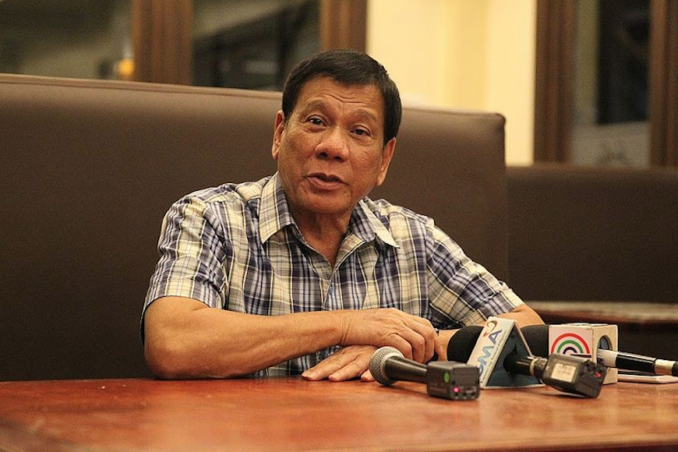
President Rodrigo Roa Duterte, during a press conference,
Presidential Communications Operations Office – Public domain
Rodrigo Duterte, alpha male mayor of second city Davao in the south of the country, was elected to the top job in 2016 and will stand down soon after serving a full term of 5 years and 320 days. In the recent May 9th 2022 election, Bongbong Marcos proved victorious 36 years after his father lost power. Speaking of fathers, simultaneously President Dutertes’s daughter Sara was elected as vice president.
Commentators around the world were surprised. The Washington Post even developed Marcos Derangement Syndrome. In an 11th May leader, the Bezos organ put the Marcos success down to a years-long strategic disinformation campaign, skilful use of YouTube, TikTok and vloggers that appealed to a young and tech-savvy Phillippine electorate, combined with a trolling operation aimed at opponents. An urban myth suggests FM’s loot has been converted into gold and will be returned to the islands and shared amongst voters. Following his own experience during half an afternoon in a dusty paddy three decades ago, this observer wouldn’t dismiss that out of hand. Serial disappointment, The Post bemoans, of impeachments, protests, corruption and worse, swung the voters to an heroic Marcos legend (FM is now interred in the National Heroes Cemetery following a Deutete pledge to Ilocos voters), that a large majority of the young population never experienced.
Well, yes and no. Although international commentators less well informed than the average Puffin were aghast at the news, they needn’t have been. The Marcos’s have kept the lion’s share of FM’s embezzled money and have a power base in their native Ilocos giving them a foothold in any election. The tribalism of a south-east Asian island nation peoples, the inherited landed wealth structure of Spanish colonialism and the get-up and go pazazz of the former American colony’s elite, suggests political power is set to remain within The Families for many elections to come.
© Always Worth Saying 2022


